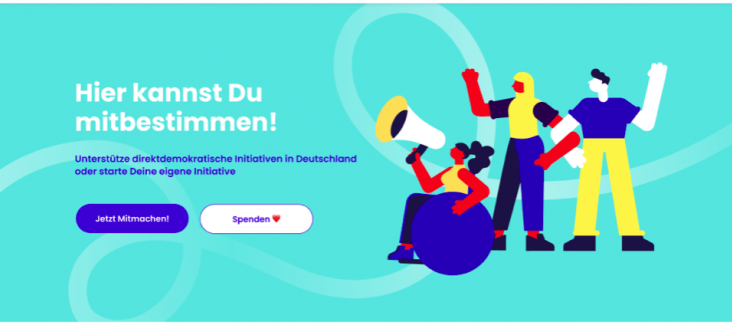How does it all work? On the one hand, initiatives can be signed via innn.it by citizens who are entitled to vote. No registration on the website is necessary for this; innn.it provides the signature lists of the respective initiative for download. In most cases, up to five people can sign the document and then send it in free of charge - all they have to do is print it out themselves, together with a pre-paid envelope from innn.it. Citizens can fill in and sign the lists in the comfort of their homes. This also reduces the likelihood of information being illegible or forgotten, which can sometimes happen in the rush of an information stand. Errors in form can therefore be avoided. In addition, the Change.org team supports initiatives with its extensive campaign experience and, as far as possible, also with tips on what can and cannot be demanded in a citizens' initiative. Here, Stanglmaier points to the Bavarian town of Moosburg, where a citizens' initiative was declared legally inadmissible because it contained, for example, amendments to a federal law as a demand. This is an issue that does not fall within the remit of a municipality.
On the other hand, those organizing citizens’ initiatives can contact innn.it in order to bring their concerns onto the platform. The prerequisite for this is that the initiatives comply with the Basic Law (Grundgesetz) and are not racist, sexist, or discriminatory. There are already a few initiatives on the homepage, almost all of which have been collecting signatures for months, but which have been thwarted by Corona; among them is the Initiative Klimawende Köln, whose problems during the pandemic Democracy International already reported on in April 2020. At that time, the need for digital tools to collect signatures was also addressed. Especially the smaller initiatives suffer from the crisis and are dependent on support. When an initiative is published on the platform, innn.it offers support to the organisers, including the offer to draw attention to it through Change.org's email distribution list.
But what happens to initiatives once they have successfully collected signatures? When they gather a certain number of signatures in a given period of time, the draft law is submitted to parliament. In the case of local citizens' initiatives, this takes place at the municipal level. If the responsible parliament rejects the draft, the citizens are then entitled to demand a referendum or citizens' vote. There is no doubt that the Corona pandemic played a major role in initiating the website, as people can no longer be reached through the usual channels. However, Stanglmaier explains, innn.it is to be further developed beyond Corona in order to strengthen direct democracy in Germany. Citizens’ initiatives do not only take place in summer; in bad weather, it is a challenge to collect signatures outside for hours, especially in winter.
Why is it still necessary to sign for initiatives on paper in the digital age? Despite the technical possibility of collecting legally secure signatures online, the legal basis is simply lacking here. Stanglmaier also hopes that the establishment of online platforms such as innn.it will trigger the process towards contemporary methods.
Ultimately, the goal of innn.it is to facilitate citizens’ initiatives in order to raise awareness of this instrument and thus to ensure that the possibilities of direct democracy are increasingly used and developed.
Another important aspect for innn.it is data security: Stanglmaier points out that transparency also plays a major role here. That is why innn.it is hosted on German servers. Personal data is only stored if the newsletter is subscribed to. All donor data is also stored in Germany, and the highest possible security is guaranteed for the data provided. In addition, the use is completely free of charge, both for the initiators and the supporters. Financing is done through donations.
Whether innn.it will be used as successfully as its Swiss counterpart WeCollect remains to be seen. So far, five local initiatives have been published on innn.it, but according to Stanglmaier, the team already has more initiatives in the pipeline that will be posted on the website in the coming weeks. In any case, with innn.it a promising hope for direct democracy is going online.

